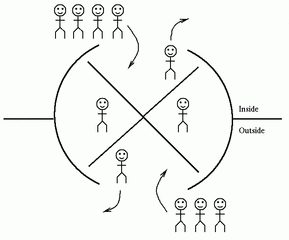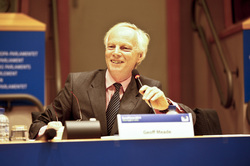 Commission diagram of proposed revolving door policy
Commission diagram of proposed revolving door policy The European Commission has installed revolving doors in the main entrances to its flagship Brussels headquarters, Berlaymont Towers. This is a slap in the face to RevolvingDoorWatch, a website run by the Corporate Europe Observatory which names and shames Commissioners, EU officials and MEPs who go through revolving doors.
Personally I can't see the harm in it, although anyone on the tubby side and carrying a packed briefcase will have a job squeezing through the new Commission doors, which are much narrower than the revolving doors in any decent hotel.
Nevertheless, this blatant intensification of the EU's revolving door policy just as a new Commission team is arriving has increased the focus on an increasingly controversial issue in all the EU institutions.
According to usually unreliable EU sources, the work was ordered after pressure from some of the incoming Commissioners who complained that the lack of revolving doors in the building where they will be working would hamper their job prospects once they leave the Commission.
A spokesman for the Corporate Europe Observatory would, if asked for a response, probably comment: "We will continue to oppose this immoral revolving door policy. We understand that Commissioners, and senior EU officials, go through a lot when they work for the institutions, but that should not include revolving doors."
The spokesman might also have admitted that the NGO had been "going round in circles" in its effort to end the revolving door habit, and then might have added: "We take comfort from the fact that, although we cannot stop these doors being installed, they are at least narrow enough to prevent the fattest of EU fatcats getting through."
In fact the narrowest EU revolving doors, and thus the hardest to get through; are those at the entrance to the Council of Ministers building opposite Berlaymont Towers, which are so tiny that Council-based Eurocrats have to queue up to leave during bottleneck rush-hours.
But at least that gives RevolvingDoorWatch time to check out suspicious characters who may be escaping from Euroland to take up lucrative but conflicting corporate or lobbying jobs.
The revolving doors at the European Parliament are much wider, which might explain why two ex-MEPs are among the three latest "profiles" to be accused by the Corporate Europe Observatory of having sneaked through them to a new, allegedly conflictual, professional life on the other side.
The third is a former senior Commission official who apparently left the service through a revolving door in one of the many other Commission buildings where they were installed years ago.
Some campaigners say the Commission should have removed all such doors from its buildings instead of simply adding them to Berlaymont Towers. But one EU official, speaking on condition of absurdity, said: "That was never an option, as anyone would tell you if they'd been around as long as I have".
Personally I can't see the harm in it, although anyone on the tubby side and carrying a packed briefcase will have a job squeezing through the new Commission doors, which are much narrower than the revolving doors in any decent hotel.
Nevertheless, this blatant intensification of the EU's revolving door policy just as a new Commission team is arriving has increased the focus on an increasingly controversial issue in all the EU institutions.
According to usually unreliable EU sources, the work was ordered after pressure from some of the incoming Commissioners who complained that the lack of revolving doors in the building where they will be working would hamper their job prospects once they leave the Commission.
A spokesman for the Corporate Europe Observatory would, if asked for a response, probably comment: "We will continue to oppose this immoral revolving door policy. We understand that Commissioners, and senior EU officials, go through a lot when they work for the institutions, but that should not include revolving doors."
The spokesman might also have admitted that the NGO had been "going round in circles" in its effort to end the revolving door habit, and then might have added: "We take comfort from the fact that, although we cannot stop these doors being installed, they are at least narrow enough to prevent the fattest of EU fatcats getting through."
In fact the narrowest EU revolving doors, and thus the hardest to get through; are those at the entrance to the Council of Ministers building opposite Berlaymont Towers, which are so tiny that Council-based Eurocrats have to queue up to leave during bottleneck rush-hours.
But at least that gives RevolvingDoorWatch time to check out suspicious characters who may be escaping from Euroland to take up lucrative but conflicting corporate or lobbying jobs.
The revolving doors at the European Parliament are much wider, which might explain why two ex-MEPs are among the three latest "profiles" to be accused by the Corporate Europe Observatory of having sneaked through them to a new, allegedly conflictual, professional life on the other side.
The third is a former senior Commission official who apparently left the service through a revolving door in one of the many other Commission buildings where they were installed years ago.
Some campaigners say the Commission should have removed all such doors from its buildings instead of simply adding them to Berlaymont Towers. But one EU official, speaking on condition of absurdity, said: "That was never an option, as anyone would tell you if they'd been around as long as I have".


 RSS Feed
RSS Feed